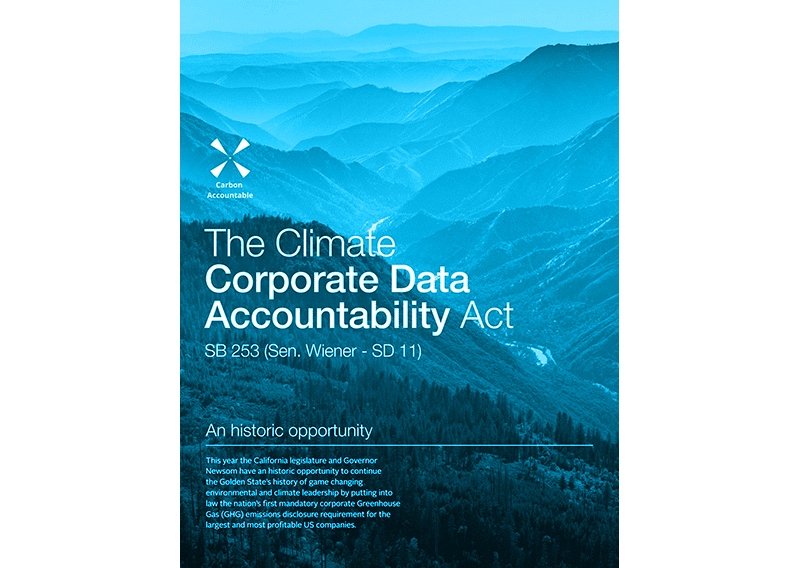The following post summarizes the article “These states are picking up the corporate climate disclosures slack,” authored by Leah Garden and published in Trellis on March 20, 2025. © 2025 Trellis Group Inc., formerly GreenBiz.
“States are stepping into the breach as other entities abandon responsibility for holding corporations accountable for climate issues.”
The article discusses the increasing role of U.S. states in mandating corporate climate disclosures as federal and international efforts wane. While the European Union is scaling back its Corporate Sustainability Reporting Directive (CSRD) and the U.S. Securities and Exchange Commission (SEC) has halted its defense of corporate emissions disclosure laws in court, states are stepping in to ensure that corporations continue to monitor and report greenhouse gas (GHG) emissions. These state-level laws target Scope 1, 2, and 3 emissions, which include direct emissions, indirect emissions from energy use, and emissions throughout the value chain.
States with Existing Laws
California
California is the only state with corporate emissions disclosure laws currently enacted. Two key laws are in place:
- SB 253 Climate Corporate Data Accountability Act: This law applies to companies with revenues exceeding $1 billion in California. It mandates reporting Scope 1 and 2 emissions based on 2025 data by 2026 and Scope 3 emissions from upstream and downstream value chains by 2027.
- SB 261 Climate-Related Financial Risk Act: This law targets companies with annual revenues of $500 million. It requires reporting financial risks caused by climate change and mitigation plans starting January 2026, with biennial updates thereafter.
States Considering Laws
Several other states are introducing legislation to mandate corporate climate disclosures:
Colorado
The Greenhouse Gas Emissions Act HB 25-1119, introduced on January 28, 2025, would apply to companies operating in Colorado with revenues exceeding $1 billion. It requires reporting Scope 1 and 2 emissions annually starting in 2028 and Scope 3 emissions beginning in 2029, with additional categories added in 2030 and 2031. The law includes provisions allowing companies to refrain from disclosing certain items based on freedom of speech considerations.
Illinois
The Climate Corporate Accountability Act, HB 3673, introduced on February 18, 2025, targets U.S. businesses operating in Illinois with revenues exceeding $1 billion. Starting January 1, 2027, it mandates annual reporting of Scope 1, 2, and 3 emissions. Emissions must be calculated using the GHG Protocol Corporate Accounting and Reporting Standard, and state-approved third-party auditors must independently verify reports.
New Jersey
The Climate Corporate Data Accountability Act SB 4117, introduced on February 3, 2025, applies to U.S. entities doing business in New Jersey with revenues exceeding $1 billion. Companies must submit a GHG emissions report three years after the law is enacted, with annual updates thereafter. Scope 1 and 2 emissions must be publicly accessible four years after enactment, and Scope 3 emissions five years after. Third-party auditors must verify reports, with assurance levels increasing over time.
New York
The Climate Corporate Accountability Act SB 3456, introduced on January 27, 2025, after a failed attempt in 2023, targets companies operating in New York with revenues exceeding $1 billion. It requires annual reporting of Scope 1 and 2 emissions starting in 2027 and Scope 3 in 2028. Reports must adhere to the GHG Protocol Corporate Accounting and Reporting Standard and the GHG Protocol Value Chain Accounting and Reporting Standard. Verification by third-party auditors is required, with assurance levels increasing by 2031.
Washington
The Washington Fashion Sustainability Accountability Act HB 1107, introduced on December 20, 2024, focuses on fashion producers selling apparel or footwear in Washington. It mandates reporting on:
- Products containing high-priority chemicals
- Definitions of marketing terms like “sustainable” and “green”
- Disposal methods and volumes of unsold products
- Environmental impact reduction initiatives and targets
Additional reporting is required on environmental due diligence policies and supplier working conditions for companies with gross incomes exceeding $100 million.
Implications for Businesses
Despite federal and international rollbacks, state-level laws require companies to continue monitoring and reporting emissions. These laws stress transparency and accountability, requiring businesses to disclose environmental impacts and mitigation strategies. Companies must be ready to comply with these regulations, which generally involve third-party verification and adherence to established standards like the GHG Protocol.
Conclusion
As federal and international efforts to mandate corporate climate disclosures diminish, U.S. states are stepping up to fill the void. California leads the way with enacted laws, while Colorado, Illinois, New Jersey, New York, and Washington are considering similar legislation. These state-level initiatives ensure corporations remain accountable for environmental impacts, promoting climate action and advancing sustainability progress.
(Source: https://trellis.net/article/these-states-are-picking-up-the-corporate-climate-disclosures-slack)
ClimaTwin® is a B2B SaaS solution that empowers stakeholders to assess the physical and financial impacts of future weather and climate extremes on infrastructure assets and the built environment.
Ready to get started? To learn more about how ClimaTwin can help you assess the physical and financial impacts of future weather and climate extremes on your infrastructure assets and investment portfolios, please visit www.climatwin.com today.
© 2025 ClimaTwin Corp. ClimaTwin® is a registered trademark of ClimaTwin Corp. The ClimaTwin logos, ClimaTwin Solutions™, and Future-proofing assets today for tomorrow’s climate extremes™ are trademarks of ClimaTwin Corp. All rights reserved, including rights for text and data mining and training of artificial technologies or similar technologies.
###


